From April 20 - 24, 2020, The Opportunity Network (OppNet) launched its seventh annual and first virtual College Access and Success Symposium (CASS). This year we hosted representatives from the admissions and student affairs offices of 50 colleges and universities for a virtual hands-on session focused on discussing college success and persistence for historically underrepresented, first-generation students from low-income backgrounds. The schools represented (see below) are committed to addressing this challenge independently, and came to the event seeking to learn and collaborate with each other.
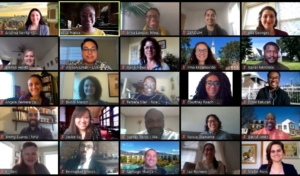

This year’s theme centered on admissions and student-affairs professionals working together to discuss and strategize how to best create, practice, and sustain student inclusivity in academic and social spaces on campus.

Participants were given three scenarios and a series of follow up questions to think critically about how some of the institutional and personal resources on their campus could address the challenges and obstacles students face when navigating academic and social spaces. Institutional resources might include offices, support services, access to information, & key individuals in a “non-passive” approach. By “non-passive” we are moving forward from simply naming resources to assessing the quality and utility of those resources. Personal resources might include peers, faculty, community-based organizations, and prior or current networks.
Below are the key insights captured from the conversation and several prompts for campus stakeholders to think about as they continue to support historically underrepresented, first generation students from low-income backgrounds (often referenced as the students we are considering in this conversation) in academic and social spaces on campus.
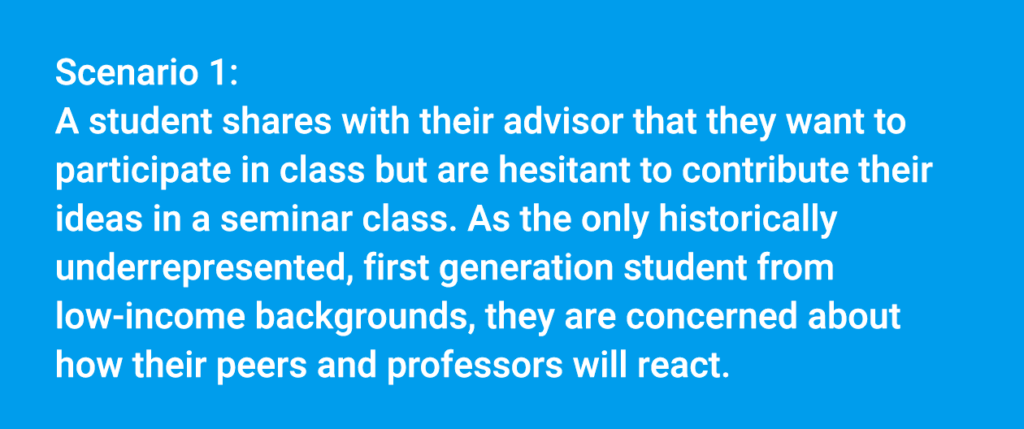
Main Takeaways:
- Provide faculty with a series of diversity and social justice trainings that build on creating an inclusive classroom environment.
- Coaching professors to set a tone that encourages and validates all students voices and perspectives.
- Inviting cultural wealth from different student lived experiences to help foster the relationship between students and their peers and professors in the classroom.
- More collaboration between students and campus offices/departments such as the academic advising center and the multicultural affairs office.
- Allowing students’ voices to be heard.
- Collecting and documenting student feedback, questions, and concerns for faculty and administration to review.
- Strategize how to implement students' feedback into the curriculum and academic experience.
- Everyone on campus is a stakeholder and has a collective responsibility to its students.
- It is important for stakeholders who self identify as our students to speak with all offices on campus.
- Create opportunities for the staff and faculty to reflect on this issue and develop or modify norms around classroom participation and engagement.
- Organizing and hosting roundtables for students to engage in conversation with professors and faculty from similar backgrounds.
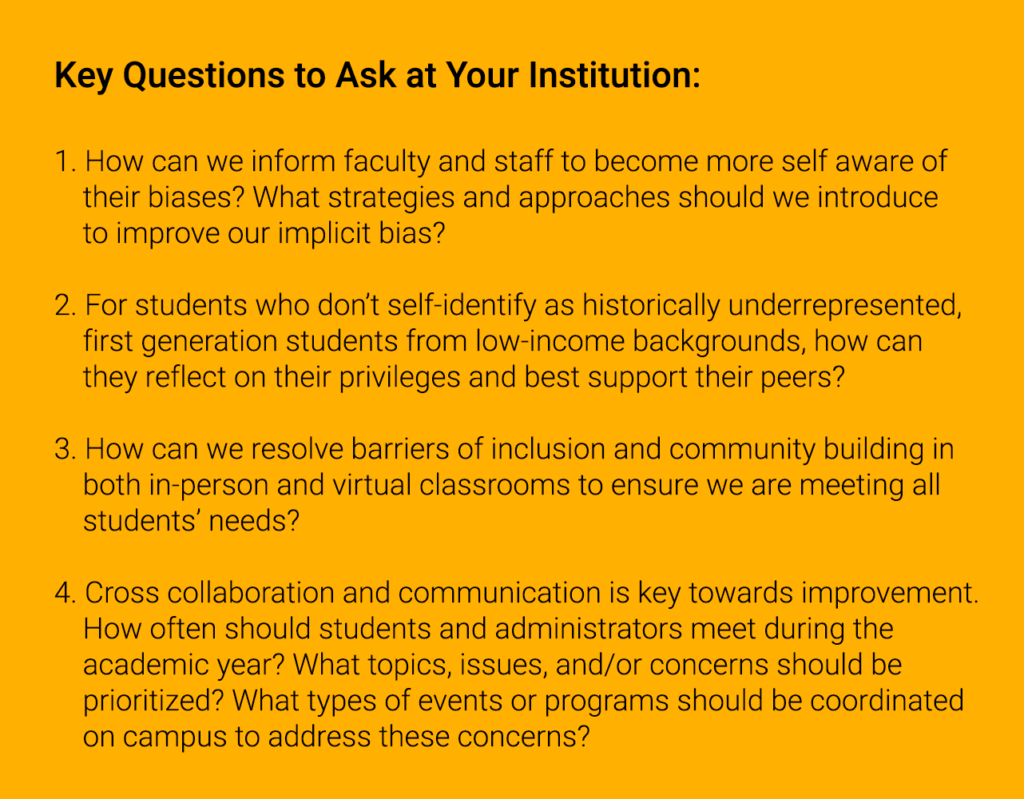
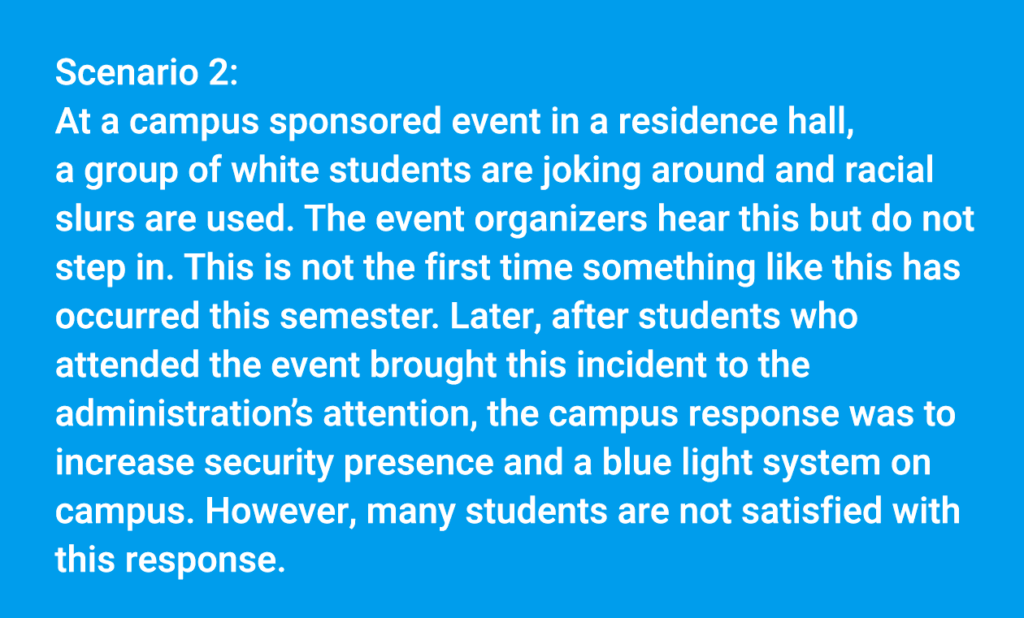
Main Takeaways:
- Campus’ response to racial tension should be treated as an issue of campus culture, not as an issue of security.
- Administrators need to bring this issue to the attention of all stakeholders and members of the community as soon as it happens. Not acknowledging a recurring incident dismisses concerns students are experiencing.
- Student voices need to be included.
- The matter needs to be investigated and hold those involved accountable.
- Professors and other faculty members who self identify as historically underrepresented, first generation students from low-income backgrounds, can host roundtable discussions where students impacted (and those who want to be educated) can come together to discuss what happened.
- Students, academic offices and multicultural affairs faculty can all join together to collaborate and brainstorm on how to improve the campus and acknowledge these issues.
- Additional sensitivity training for RA’s, professors, campus safety employees, etc.
- Creating systems to address these types of incidents ahead of time.
- Systems in place will show community members that this behavior will not be tolerated.
- Being more mindful about which students are being admitted and which staff are being hired/tenured.
- Students and faculty are often overburdened when these issues arise because they feel they’re the only ones qualified to navigate these issues.
- Training all staff and students on why this behavior is unacceptable and teaching how to combat the injustices when they do arise is a great way to demonstrate that this behavior will not be tolerated.
- Incorporate systems into the freshman year/summer program curriculum for all students and into mandatory professional development training for staff.
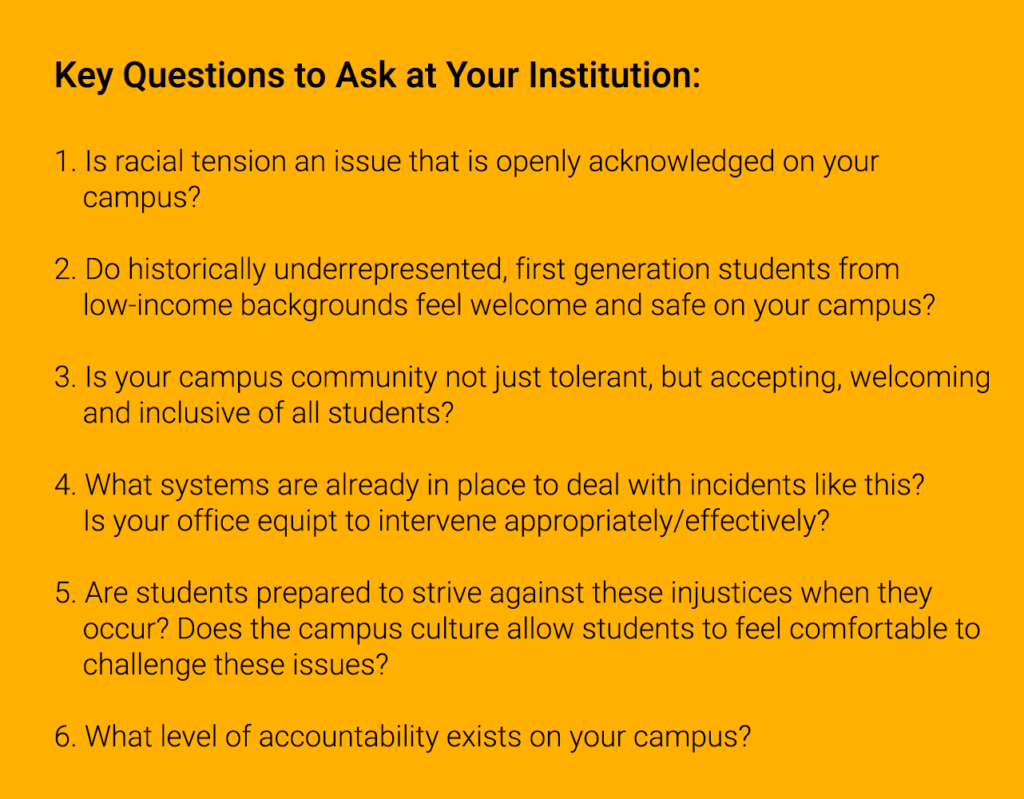

Main Takeaways:
- Encouraging students to find a space that works for them and can foster a sense of community.
- Finding inclusive groups where students can gain confidence and develop new relationships
- Speaking to students in ways that are familiar to them
- Capitalize on different forms of engagement (in person, virtual, social media, chat function during meetings).
- Virtual Club Fairs
- Outdoor orientation programs
- Zoom hangouts with affinity groups Student panels that address student concerns such as imposter syndrome with panelists who self identify as historically underrepresented, first generation students from low-income backgrounds
- Students are concerned about being socially isolated
- How to utilize tools they are already familiar with?
- Role of admissions = establishing connection with students
- How do admission officers promote their campus community?
- How can current students be more involved in the recruitment process?
- Encouraging students to learn outside of the classroom
- Identifying student leaders to connect and engage with students
- Think about the importance of human story-telling/narratives
- Normalize concerns, struggles, and destigmatize
- Humanize ourselves
- Normalize sense of belonging as a psychological need and articulate from the very start of student’s experience
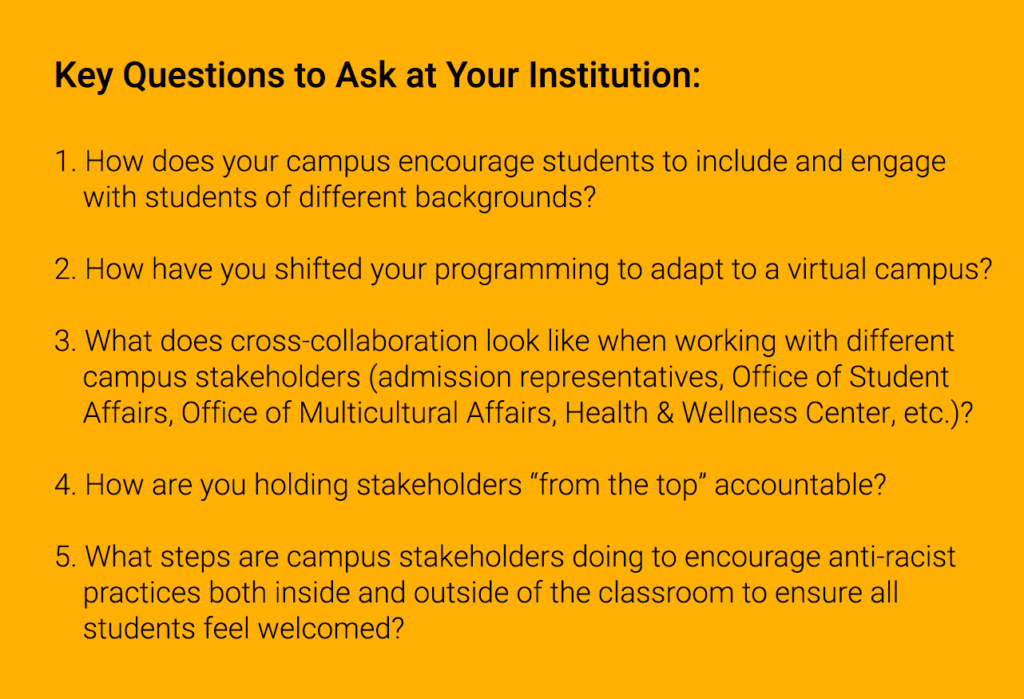
Moving Forward:
We encourage campus stakeholders to continue this conversation and include students in the process of developing, creating, and sustaining effective solutions to the challenges and conflicts that arise for students in the academic and social spaces on campus. This year we learned that the following themes emerged across all three scenarios:
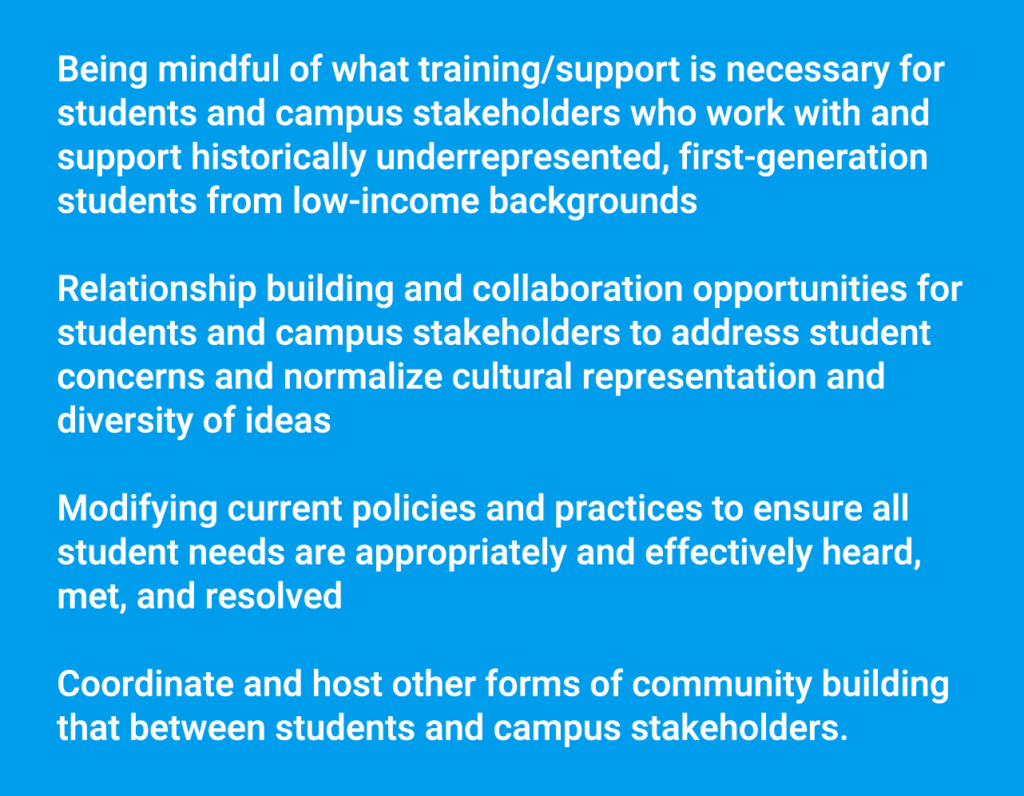
OppNet will continue its commitment to addressing these themes and working with campus stakeholders to ensure college persistence and success. For more information, please contact Luz Romero, College Guidance and Transition Program Associate, at [email protected], Kimberly Cabera, College Guidance and Transition Program Associate, at [email protected], or Mia Flores, College Success Program Associate, at [email protected].
Schools Represented:
- Babson
- Barnard
- Bates
- Boston University
- Bowdoin
- Brandeis
- Carnegie Mellon
- Claremont
- McKenna
- Colorado
- Columbia
- Dartmouth
- Dickinson
- Franklin & Marshall
- Gettysburg
- Grinnell
- Hamilton
- Harvey Mudd College
- Ithaca
- Lafayette
- Macalester
- Mount Holyoke
- Muhlenberg
- New York University
- Northeastern
- Olin College of Engineering
- Pitzer
- Reed College
- Rice University
- Skidmore
- Swarthmore
- Syracuse
- The George Washington University
- Trinity
- Tulane
- Union
- The University of Chicago
- University of Pennsylvania
- University of Pittsburgh
- University of Southern California
- University of Virginia
- Ursinus
- Vanderbilt
- Vassar
- Washington U. in St. Louis
- Wheaton College
- Williams
